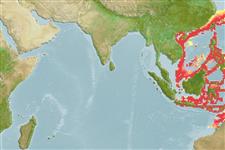Environment: milieu / climate zone / depth range / distribution range
Ecología
marino demersal; rango de profundidad 60 - 142 m (Ref. 5222). Tropical; 31°N - 17°S, 106°E - 126°E (Ref. 5222)
Eastern Indian Ocean and Western Pacific: known only from southern Japan, Hong Kong, Hainan Islands of China, Viet Nam, South China Sea, Java, and northwest Australia. Record from Taiwan (Ref. 6864) is dubious.
Tamaño / Peso / Age
Maturity: Lm ? range ? - ? cm
Max length : 33.0 cm SL macho / no sexado; (Ref. 5222)
Espinas dorsales (total) : 11; Radios blandos dorsales (total) : 15 - 16; Espinas anales: 3; Radios blandos anales: 8. Preopercle with 1 - 4 distinctly enlarged serrae at its angle; upper edge of the operculum straight; nostrils subequal. Pectoral fins not fleshy. Pyloric caeca 12. Body and head yellowish brown dorsally, whitish ventrally, with numerous small dark brown to black dots on the upper sides, and 5 faint oblique bars, which may disappear in preservative; the chest and ventral parts of the head pale reddish orange. The fins are pale, with the rays darker than the membrane; the soft dorsal and caudal fins with narrow dark brown margin.
Found on the continental shelf (Ref. 75154), over mud and sand substrata (Ref. 89707). Caught by trawling at depths ranging from 37 to 142 m. The small size and poor edible quality probably accounts for its low value in the markets.
Life cycle and mating behavior
Madurez | Reproducción | Puesta | Huevos | Fecundidad | Larva
Heemstra, P.C. and J.E. Randall, 1993. FAO Species Catalogue. Vol. 16. Groupers of the world (family Serranidae, subfamily Epinephelinae). An annotated and illustrated catalogue of the grouper, rockcod, hind, coral grouper and lyretail species known to date. Rome: FAO. FAO Fish. Synop. 125(16):382 p. (Ref. 5222)
IUCN Red List Status (Ref. 130435: Version 2024-2)
Threat to humans
Harmless
Human uses
Pesquerías: escaso valor comercial
Herramientas
Special reports
Download XML
Fuentes de Internet
Estimates based on models
Preferred temperature (Ref.
123201): 17.9 - 26.6, mean 22.5 °C (based on 79 cells).
Phylogenetic diversity index (Ref.
82804): PD
50 = 0.5000 [Uniqueness, from 0.5 = low to 2.0 = high].
Bayesian length-weight: a=0.01175 (0.00568 - 0.02430), b=3.04 (2.88 - 3.20), in cm total length, based on LWR estimates for this Genus-body shape (Ref.
93245).
Nivel trófico (Ref.
69278): 3.8 ±0.6 se; based on size and trophs of closest relatives
Resiliencia (Ref.
120179): Medio, población duplicada en un tiempo mínimo de 1.4-4.4 años (Preliminary K or Fecundity.).
Fishing Vulnerability (Ref.
59153): Low to moderate vulnerability (30 of 100).
